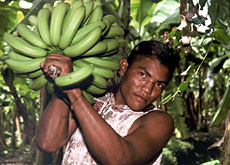
Fair trade a hit with the Swiss

The Swiss branch of the Max Havelaar Foundation has every reason to celebrate its 10th birthday this week.
Swiss consumers led Europe in their purchase of Max Havelaar products in 2001, buying €6.75 worth per head of population each year.
This is more than double the figure of around three euros per head of population in the Netherlands, where the Max Havelaar Foundation first originated.
The Foundation is dedicated to promoting equitable trade between developed and developing countries, and guarantees farmers fair prices for products such as coffee, chocolate and rice.
It also seeks to ensure that its products are produced in an environmentally sustainable way. (see related article)
Dutch roots, Swiss growth
The Foundation was born in the Netherlands in 1989, the brainchild of Nico Roozen and Frans van der Hoff, two Dutch citizens committed to creating a fairer trading relationship between rich and poor countries.
But it is the Swiss branch of the foundation which has proved the most successful: in 2001, Max Havelaar Switzerland had a turnover of SFr85 million – an increase of 35 per cent on the previous year.
“Switzerland does have a long tradition of solidarity,” Paola Ghillani, director of Max Havelaar Switzerland told swissinfo.
Big retailers make a difference
But in other countries such as the Netherlands and Germany where interest in fair trade products is also strong, the market for Max Havelaar products is stagnating.
The reason may be the failure of the foundation to attract large retailers into stocking their products.
In Switzerland on the other hand, the two biggest supermarket chains, Migros and Coop, have had Max Havelaar products on their shelves for several years.
“The fact that Migros and Coop stock our products is a big factor in our success,” admitted Ghillani.
Consumer power
Swiss consumers are clearly attracted to the Havelaar trademark. Coffee, bananas and orange juice bearing the Max Havelaar seal of approval are especially popular.
“Swiss consumers are sensitive to the fact that they have power,” said Simonetta Sommaruga, head of the Swiss Consumers’ Association.
“They know that buying something is a political act, and that by choosing one product over another, you also choose the living conditions of those who produce that product.”
But Sommaruga also agrees that the decision of the big Swiss retailers to stock Max Havelaar products has been crucial.
“For a start it means that consumers who weren’t necessarily that sensitive to fair trade products now have access to them,” she told swissinfo.
“And of course everyone profits,” she continued. “The Coop in particular realised several years ago that it needed new ways of attracting shoppers, and stocking ethical and ecological products was a good way to do that. It’s good for their image.”
A mark of reliability
Meanwhile the Coop’s biggest rival, Migros, points out that, among numerous products and associations claiming to guarantee fair trade, the Max Havelaar Foundation stands out as a symbol of reliability.
“We chose to deal with the Max Havelaar Foundation because we knew it was a serious organisation,” said Migros spokeswoman Fausta Borsani.
Contrary to popular belief, Max Havelaar products do not cost substantially more than the same products from the big multi-nationals.
Havelaar bananas, for example, often cost just the same, while orange juice is generally only a few centimes more per litre.
“Customers are prepared to pay more for products like this, but not much more,” explained Simonetta Sommaruga.
“If the price difference becomes big, business will fall, but if it stays marginal, then I’m convinced the market for fair trade will grow in our country.”
swissinfo, Imogen Foulkes
Max Havelaar products in Switzerland: coffee, honey, cocoa, sugar, tea, bananas, orange juice, flowers, rice
Planned products: mangos, pineapples, footballs
Annual turnover 2001: SFr84 million
62 per cent of Swiss consumers recognise the Max Havelaar seal of approval

In compliance with the JTI standards
More: SWI swissinfo.ch certified by the Journalism Trust Initiative





























You can find an overview of ongoing debates with our journalists here . Please join us!
If you want to start a conversation about a topic raised in this article or want to report factual errors, email us at english@swissinfo.ch.